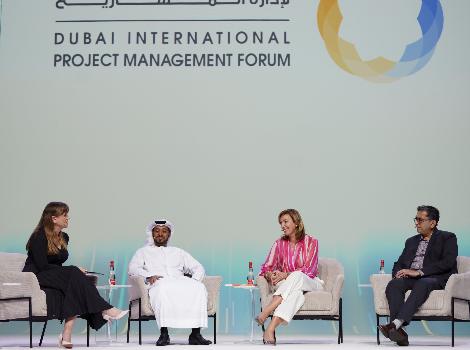Pioneering Leaders Discussed The Path To Circular Economy Integration At DIPMF

Pioneer leaders discussed the integration of the circular economy at the Dubai International Project Management Forum (DIMPF). During a panel discussion titled “Project and Circular Economy,” they agreed that collaboration among industry leaders is essential for driving the circular economy and enabling sustainable and economically viable projects.
The discussion, moderated by Brandy Scott, featured distinguished panellists, including Eng. Mohammed Rashed, CPO Nakheel, Ladeja Godina Kosir, Founder and Executive Director at Circular Change& CO-chair of ECESP, and Hemant Chaudhary, Founder, Managing Director, Circular Economy Alliance Australia.
The panel focused on the pivotal role of projects in enhancing short-term performance and creating long-term value within the circular economy framework. They discussed integrating circular economy principles into projects and how these practices can improve short-term performance and create long-term value. The panellists explored these practices’ organizational, cultural, and economic implications and featured distinguished figures from the public and private sectors. They also discussed the evolving skills required for leaders to excel in circular projects, emphasizing the need for adaptability and innovation.
Mohammed Rashed has shared Nakheel’s best practices in project management and highlighted that the company is leading the way in aligning its efforts with Dubai’s grand vision outlined in Dubai Airplane 2040 and the Dubai 33 Agenda. These strategic initiatives are aimed at doubling the economy by 2030 and improving the well-being of residents, emphasizing a commitment to overall progress.
He added that stakeholders, ranging from shareholders to management, are increasingly supporting the principles of the circular economy. This movement is gaining momentum with its far-reaching impact on environmental, social, and economic fronts. CEOs are encouraged to prioritize ownership and connectivity at the highest levels to promote this paradigm shift. They should ensure the active involvement of not only their workforce but also their contractors and suppliers. This collective engagement creates a culture deeply rooted in the principles of the circular economy, which weaves an intricate fabric.
Nakheel is a strong advocate for protecting the environment and nurturing nature. He believes that nature provides us with essential resources such as food, water, and oxygen for current and future generations. To increase awareness about the importance of nature, he suggests engaging in outdoor activities. Nakheel also emphasizes the importance of a circular economy, which is necessary to prevent scarcity and resource depletion.
In the construction industry, Nakheel recommends a multifaceted approach to tackle the shortage of contractors due to resource, labour, and material constraints. He suggests prioritizing sustainable building practices, efficient material usage, streamlined execution, and realistic project timelines. These strategies will help address the challenges faced by the construction industry and support Dubai’s visionary agendas.
During the discussion, Kosir talked about the potential for circular strategies to generate both short and long-term value. Chaudhary emphasized the importance of collaboration between businesses and external stakeholders in developing, promoting, and executing circular strategies.


